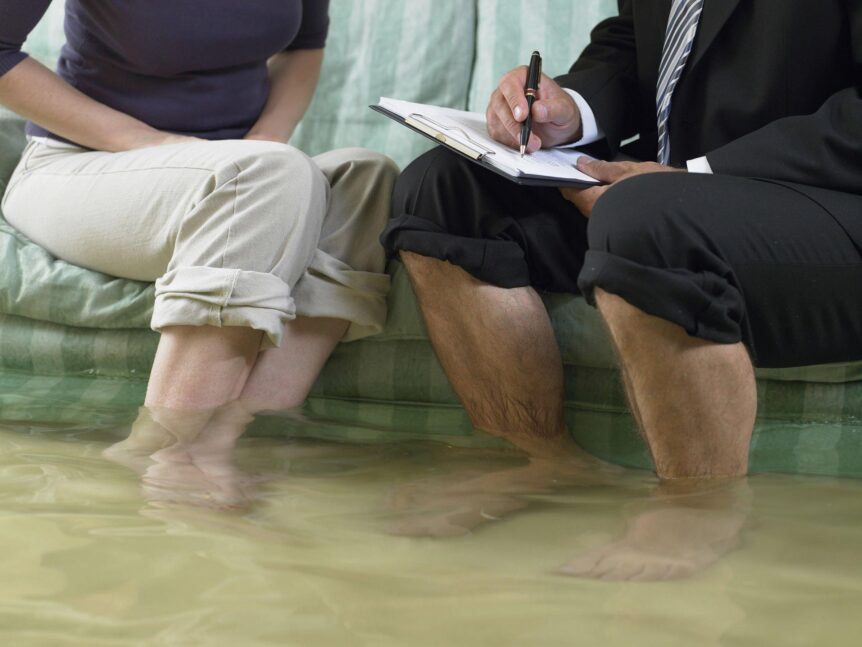When it comes to securing your home against the unpredictable forces of nature, few places in the United States face the same level of risk as the Sunshine State. Indeed, the need for comprehensive flood insurance in Florida cannot be overstated. Owning a home in this beautiful state means embracing its unique challenges, and foremost among them is the constant threat of flooding. Florida is no stranger to heavy rains, hurricanes, and storm surges that can cause extensive damage to homes.
In this blog, we will delve into three crucial things that homeowners in Florida should know about flood insurance. From the lack of seller disclosure requirements to the types of flood insurance available and the limitations of federal aid, understanding these key aspects can help you protect your investment and peace of mind.
3 Things to Know About Flood Insurance in Florida
-
Sellers Aren’t Required to Disclose Flood Risk
While Florida is notorious for its susceptibility to flooding, it’s surprising that state law does not mandate sellers to disclose flood risk or a property’s flood history to potential buyers. This lack of obligation places a significant responsibility on the shoulders of prospective homeowners. During your property inspection or walkthrough, it is imperative to watch for any signs that the property may have experienced flooding in the past or could be prone to future floods.
According to the Natural Resources Defense Council (NRDC), Florida courts have ruled that sellers must disclose facts about a property that is not immediately visible and could affect its value or desirability. However, there have been exceptions, creating a gray area when it comes to flooding disclosure.
To add to the complexity, Florida Realtors offer sellers the option to complete a voluntary disclosure form. This form queries sellers about various flood-related matters, including any knowledge of past or current drainage or flood problems affecting the property, whether the property is situated in a special flood hazard area, and whether flood insurance is required. It also probes into potential violations of local flood guidelines in the construction of improvements.
Additionally, it’s essential to note that the rarity of Florida homes’ basements does not exempt them from potential flooding. In fact, some Florida homes have basements, making it crucial to pay close attention to these properties for flood-related risks.
-
There Are Two Types of Flood Insurance
Building insurance covers essential structural components such as electrical and plumbing systems, furnaces, water heaters, built-in appliances, flooring, cabinets, and more. On the other hand, content insurance covers personal belongings like clothing, furniture, electronic equipment, curtains, appliances, and valuable items such as artwork and furs (up to $2,500).
In the event of a flood-related claim, it’s imperative to substantiate the value of damaged property and belongings to the insurance adjuster. Safeguarding original receipts and documentation in a waterproof container, placed on an elevated surface, ensures they remain intact and accessible. Capturing photographs of the damage prior to cleanup is also vital. Additionally, insurance policies require homeowners to take prompt action in mitigating further damage, including thorough drying of the affected area and measures to prevent or address potential mold growth, as moisture provides an optimal environment for mold development.
-
Federal Aid Is Only Available After a Disaster
Relying solely on federal disaster assistance is not a wise strategy for homeowners in Florida. Federal aid becomes accessible only when the president declares a relatively rare disaster. Furthermore, federal assistance often comes in the form of a loan that must be repaid with interest, making it less than ideal for recovering from flood damage.
In cases where a disaster is declared, some flood victims may receive a FEMA disaster grant, with an average amount of around $5,000 per household. While this grant provides initial relief, it pales compared to the average flood insurance claim, which exceeded $40,000 in 2018. Unlike federal aid, flood insurance doesn’t require repayment, offering homeowners the means to recover from the devastation caused by flooding fully. Federal assistance is intended to kickstart the recovery process but should not be relied upon to cover all costs.
Claiming Against Your Flood Insurance in Florida? Get the Support You Need
In the event that you need to navigate the complexities of claiming against your flood insurance in Florida, it’s essential to have the right support on your side. Contact RRBH Law, serving the Greater Miami Area and communities across Florida, including Key Biscayne, Coconut Grove, Hialeah, South Miami, Pinecrest, Palmetto Bay, Kendall, Glenvar Heights, Westchester, West Miami, Brickell, Sweetwater, Doral, Miami Springs, and Miami Beach. Contact RRBH Law at 305-800-4663 for the support and guidance you deserve.

